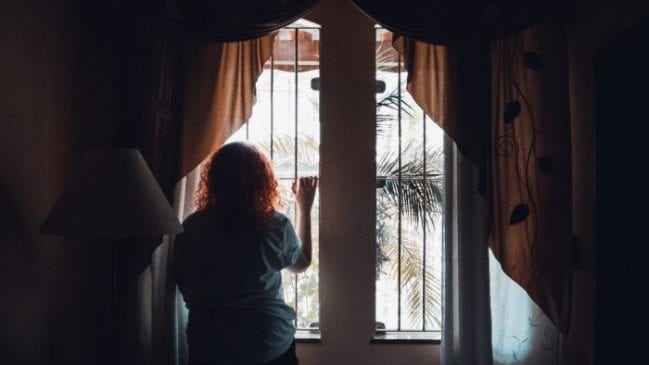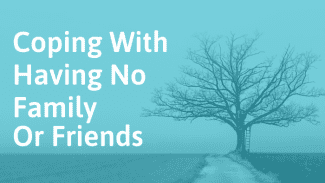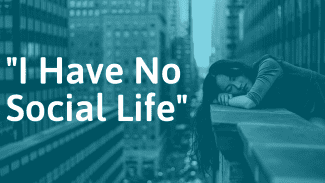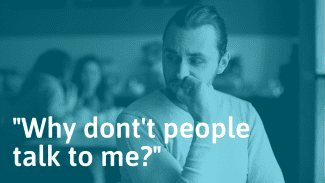As a rehabilitation consultant for twenty years, I’ve helped clients name and claim the ways they build social support. Though we are all different in how we meet our social needs (as introverts or extroverts), we all certainly benefit more from the quality of our relationships than the quantity of our connections. In examining our social support networks, it is also important to be aware of what may be isolating us or posing barriers to connection, both externally (socioeconomic forces) as well as internally (psychological forces). When we can identify the forces that isolate us, we are better able to be proactive with interventions to break out of that isolation and build the kind of support we need.
But then came COVID-19 to complicate things for our social life, and perhaps add to our isolation and loneliness.
The purpose of this self-assessment is to give you insight about the ways social isolation or loneliness may be affecting you since the pandemic. People of all ages are reporting how COVID-19 is interfering with their social life and often making them feel lonelier. This assessment is a reflective exercise to examine your life situation and spot ways to increase social connection if you think it is needed. There are no measurements in this assessment and there is no need to judge or measure yourself. This exercise is a way to take a close look at what is important to you about how to build your social life moving forward—especially considering the effects of the pandemic.
Part One. What’s Isolating You?
For questions 1–5, choose the answer that best describes you. There are no right or wrong answers.
1. Are you sensitive to social judgment?
a. I don’t join in social events, period—way too much pressure (even remotely).
b. I’m sensitive to being judged by others and must pick situations carefully in which I feel comfortable.
c. I sometimes feel uncomfortable, but I usually can adapt to social events.
d. Social judgment doesn’t bother me too much. I don’t let what other people think of me get in the way of having a great time.
2. Is a stigmatized issue isolating you?
a. I’m dealing with an issue that I can’t talk about with anyone.
b. I’m dealing with an issue that I can only share with one or two people—otherwise, it’s a topic I don’t discuss.
c. I have an issue that is hard to talk about with most people, but I’ve found a supportive group of people with whom it’s okay to talk about it.
d. I don’t have issues that I need to hide in my life now. I share almost anything.
3. Are you comparing yourself with others?
a. I am facing issues that make me feel inferior to others. I lack what most of my peers have.
b. I feel inferior to others in certain social situations, but I do have some friends and colleagues who totally accept me as I am.
c. I usually don’t feel inferior to others. It really doesn’t bother me most of the time how other people live. (But yeah, every now and then I get a bit envious.)
d. I’m very content with what I have and what I’ve achieved.
4. Have changes in your life over the past few months affected your sense of self-worth?
a. My feelings of not being worthy frequently bother me.
b. I feel, at least sometimes, that I have a lot to offer others. But I can still feel bad about myself more often than I’d like.
c. I am a fairly confident person and feel good about myself most of the time.
d. Fortunately, I’m very accepting of myself and feel that I am a good, trustworthy person who has much to offer others.
5. Social impact since March 2020
a. Living with this pandemic has generally made me feel lonelier.
b. This pandemic makes me feel lonely sometimes, but not every day.
c. I have rarely felt lonely during the pandemic.
d. The pandemic has not made me feel lonely.
If you answered mostly As or Bs (on three or more questions), you are probably feeling the impact of social isolation complicated by the effects of the pandemic. You might benefit from having a compassionate, nonjudging, and accepting person— a confidant, therapist, or coach—to help you face your situation and plan how to take action to break through isolation and alleviate your loneliness. You might also benefit from a support group or a group of like-minded people isolated in similar ways as you are to boost your confidence. If you answered mostly Cs and Ds, it’s probably easier for you to join in social events without feeling too vulnerable, lonely, or “needy.”
Part Two: Examining Life Situations that Could Be Isolating
If the following situation is true in your life, has COVID-19 made it lonelier for you?
- I live alone. (One in four Americans lives alone.) Y__N__
- I have a chronic or serious illness or chronic pain (a physical or mental illness). Y__N__
- I have a disability (visual, hearing, mobility, brain injury, developmental, other). Y__N__
- I am a primary caregiver for a family member with an illness or a disability. Y__N__
- I am a parent who works from home. Y__N__
- I have lost some or most of my income. Y__ N __
- I’ve lost my job or business, where I regularly had social contact with others. Y__N__
- I’m working weekends or overnights and possibly missing out on social opportunities. Y__N__
- I work from home using Zoom and other teleconferencing tools. Y__N__
- I lack transportation for my errands, doctor visits, and/or social visits. Not being able to get around easily makes me feel lonelier. Y__N__
- I’ve been dealing with the fear of being evicted or losing my housing. Y__N__
- I live in a rural area and I’m “cut off” from services and social events. Y__N__
- I’ve gone through a divorce, separation, or breakup within the past year. Y__N__
- I am working on my recovery from substance use. Y__N__
- I have been grieving the death of a loved one (family member or close friend) in the past 12 months.
- The pandemic has made it more difficult to find support from others. Y__N__
- The pandemic has made me feel more isolated in my grief process. Y__N__
- I relocated to a new city or state in the past 12 months. Y__N__
- I’m retired. I’ve found it lonelier being retired since the pandemic. Y__N__
- Describe your own isolating life situation: __________________________________. Has the pandemic increased your loneliness in this situation? Y__N__
If you have identified the specific ways COVID-19 has made you feel lonelier, you are able to see more clearly the ways your life situation is being impacted. Hopefully, this insight gives you permission to be compassionate and patient with yourself. But this also helps to clarify what actions you can take to alleviate loneliness. For example, if you live alone and the pandemic has made you feel lonelier living alone, there may be ways to alleviate your loneliness (such as getting a pet, or getting to know your neighbors more, or moving in with friends).
If you have identified ways that COVID-19 has increased your loneliness–and because this pandemic may continue for another year–it’s likely that you will need to take a proactive approach and put more effort into building support networks. In Part Three you can examine where you are already being socially proactive and perhaps spot opportunities to take more action to build social connection.
Part Three: How Are You Staying Connected?
How are you being proactive at keeping your social connections going strong?
Below are solid solutions that you might already be doing to alleviate loneliness and build social networks.
Check any of the actions that you are taking so far. Even one or two of the following actions can help to buffer the effects of loneliness and isolation. Remember, it’s the quality of the social activity that’s important, not just the quantity of your social connections. In fact, if any one of these activities is particularly helpful, perhaps that is a signal to do more of that activity.
Helping Others
__ I’m checking in regularly with my friends and loved ones to see how they are holding up. (Online or offline)
__ I’m regularly volunteering my time to help people in need. (Remotely or otherwise)
__ I’m helping out people in my household or my neighbors on a regular basis.
__ Other____________________________________
Classes, Study Groups, Higher Learning (Online or Offline)
__ I’m taking a class (personal interest) and interacting with class members by engaging in discussion.
__ I’m enrolled in a course(s) that is a requirement to obtain a degree or certification which at times involves interaction and discussion.
__I’m interacting with members of a study group where we all share similar interests, values, passions.
__I’m teaching a class or leading a study group (as a volunteer or as a side gig)
__Other_____________________________________
Talking with a Friend, Confidant, Therapist, or Mentor When You Need Support
__ I am working with a therapist
__ I am working with a mentor or coach
__ I am talking with a trusted friend
__ I am talking with a family member
__ I call a warmline or support line
__ I talk with a chaplain or spiritual (faith-based) advisor
__ Other support_______________________________
Interest Groups (Online and Offline, where you have social interaction about common interests and passions with fellow enthusiasts)
__Outdoor Activities, such as walking, hiking, kayaking, sailing, birding, gardening, biking
__Sports
__Art, Music, Dance, Theater, Film, Photography, Writing
__Spiritual and Faith-based Activities
__Animal Lovers
__Games, Gaming
__ Activism, Social Causes, Political Campaigns
__ Watch Parties on Facebook or similar events online
__ Other______________________________
Support Groups for handling issues and situations that are difficult or isolating
__ I’m in a 12-step or recovery group
__ I’m in a group specifically for social anxiety
__ I’m in a grief support group
__ I’m in a support group for a chronic illness (physical or mental illness)
__ I’m in a support group for job loss or unemployment
__ I’m in a support group for parents
__ I’m in a support group for caregivers
__ Other support group____________________________
Sharing Things You Make for Others
__ I like to get creative and make things for my friends and loved ones (crafts, beading, gifts, cards, cooking, woodcarving, sewing, poems, and much more)
__ I blog or vlog to share with others
__I submit stories or articles I’ve written to websites
__Other things I make that I share____________________________
Sharing Things You Enjoy with Others and Starting Conversations about Them
__ I share helpful or uplifting media on social media or apps (such as podcasts, book reviews, movies, music on Spotify, videos on TikTok, photos on Instagram)
__Other things I share_____________________________
Other Ways You Are Staying Connected
What are the other ways you are keeping in touch or building community?
______________________________________________________________
Are there new ways to expand or enrich your social life?
________________________________________________________________
Conclusion
Personally, as well as collectively, we can tackle loneliness as advocates for building communities online and offline (safely) because COVID-19 has made us more aware of the impact of isolation. With our own compassion and understanding, we can turn our loneliness into a sense of purpose to help those who may be even more isolated than we are. Many of us have already noticed how COVID-19 has started to eradicate the stigma of loneliness and isolation.
There is no shame in admitting you are lonely and need support—especially since COVID-19 invaded our lives. At least now, since the pandemic, we all have a good, honest reason to feel isolated, alone, and left out. Most of us are feeling similar emotions of grief, anxiety, fear, uncertainty, and even abandonment. Yet, in the midst of this chaos, we can be companions for one another as we all muddle through these uncertain times by being patient, understanding, and compassionate—especially with ourselves.
Author’s note: Parts of the self-assessment are adapted from my book, 400 Friends and No One to Call, with permission from the publisher, Central Recovery Press.
Image: Photography PEXELS, Eric Antunes





